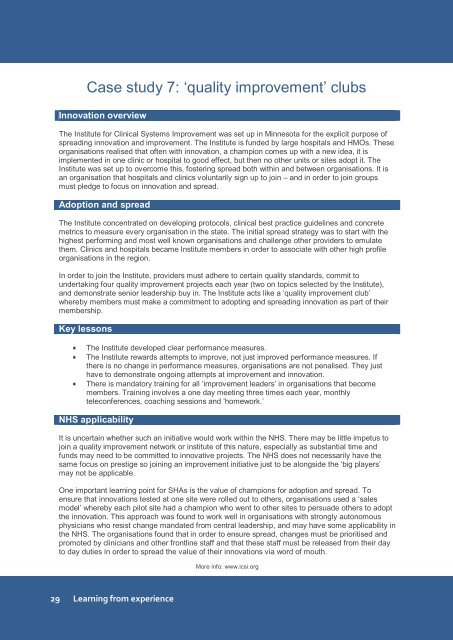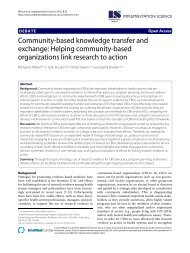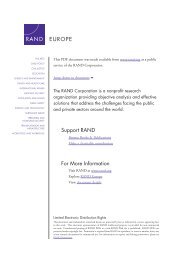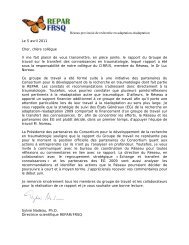Promoting and Embedding Innovation
Promoting and Embedding Innovation
Promoting and Embedding Innovation
You also want an ePaper? Increase the reach of your titles
YUMPU automatically turns print PDFs into web optimized ePapers that Google loves.
Case study 7: „quality improvement‟ clubs<br />
<strong>Innovation</strong> overview<br />
The Institute for Clinical Systems Improvement was set up in Minnesota for the explicit purpose of<br />
spreading innovation <strong>and</strong> improvement. The Institute is funded by large hospitals <strong>and</strong> HMOs. These<br />
organisations realised that often with innovation, a champion comes up with a new idea, it is<br />
implemented in one clinic or hospital to good effect, but then no other units or sites adopt it. The<br />
Institute was set up to overcome this, fostering spread both within <strong>and</strong> between organisations. It is<br />
an organisation that hospitals <strong>and</strong> clinics voluntarily sign up to join – <strong>and</strong> in order to join groups<br />
must pledge to focus on innovation <strong>and</strong> spread.<br />
Adoption <strong>and</strong> spread<br />
The Institute concentrated on developing protocols, clinical best practice guidelines <strong>and</strong> concrete<br />
metrics to measure every organisation in the state. The initial spread strategy was to start with the<br />
highest performing <strong>and</strong> most well known organisations <strong>and</strong> challenge other providers to emulate<br />
them. Clinics <strong>and</strong> hospitals became Institute members in order to associate with other high profile<br />
organisations in the region.<br />
In order to join the Institute, providers must adhere to certain quality st<strong>and</strong>ards, commit to<br />
undertaking four quality improvement projects each year (two on topics selected by the Institute),<br />
<strong>and</strong> demonstrate senior leadership buy in. The Institute acts like a „quality improvement club‟<br />
whereby members must make a commitment to adopting <strong>and</strong> spreading innovation as part of their<br />
membership.<br />
Key lessons<br />
The Institute developed clear performance measures.<br />
The Institute rewards attempts to improve, not just improved performance measures. If<br />
there is no change in performance measures, organisations are not penalised. They just<br />
have to demonstrate ongoing attempts at improvement <strong>and</strong> innovation.<br />
There is m<strong>and</strong>atory training for all „improvement leaders‟ in organisations that become<br />
members. Training involves a one day meeting three times each year, monthly<br />
teleconferences, coaching sessions <strong>and</strong> „homework.‟<br />
NHS applicability<br />
It is uncertain whether such an initiative would work within the NHS. There may be little impetus to<br />
join a quality improvement network or institute of this nature, especially as substantial time <strong>and</strong><br />
funds may need to be committed to innovative projects. The NHS does not necessarily have the<br />
same focus on prestige so joining an improvement initiative just to be alongside the „big players‟<br />
may not be applicable.<br />
One important learning point for SHAs is the value of champions for adoption <strong>and</strong> spread. To<br />
ensure that innovations tested at one site were rolled out to others, organisations used a „sales<br />
model‟ whereby each pilot site had a champion who went to other sites to persuade others to adopt<br />
the innovation. This approach was found to work well in organisations with strongly autonomous<br />
physicians who resist change m<strong>and</strong>ated from central leadership, <strong>and</strong> may have some applicability in<br />
the NHS. The organisations found that in order to ensure spread, changes must be prioritised <strong>and</strong><br />
promoted by clinicians <strong>and</strong> other frontline staff <strong>and</strong> that these staff must be released from their day<br />
to day duties in order to spread the value of their innovations via word of mouth.<br />
More info: www.icsi.org<br />
29 Learning from experience
















